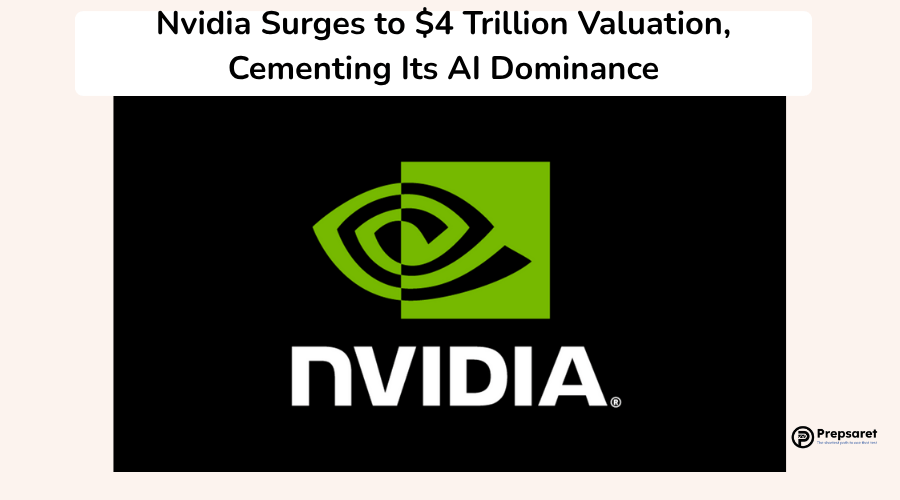Key Points:
- Nvidia becomes the first company to briefly reach a $4 trillion market value, fueled by soaring AI demand.
- Shares have climbed over 70% since April lows, outpacing Microsoft and Apple.
- The company expects continued revenue growth amid challenges in China and rising competition.
Nvidia’s Record-Breaking Rally Amid AI Boom
Nvidia has made history, briefly reaching a $4 trillion market capitalization on Wednesday, driven by relentless demand for its AI chips. The milestone positions Nvidia as the first company ever to touch this valuation during trading, underscoring Wall Street’s confidence in the company’s central role in the artificial intelligence revolution.
Shares of the California-based chipmaker rose as much as 2.8% to an all-time high of $164.42 before closing at $162.88, bringing its value just below the $4 trillion mark at $3.97 trillion.
Nvidia has seen a remarkable rebound, rising over 70% since its April lows when markets were shaken by President Donald Trump’s tariff announcements. It has also surged nearly 20% this year alone and has climbed over 1,500% in the last five years, reflecting its explosive growth trajectory.
Analysts view Nvidia’s milestone as a defining moment for the tech industry. “It highlights that companies are shifting investments toward AI, and it’s the future of technology,” said Robert Pavlik, senior portfolio manager at Dakota Wealth.
Powering the AI Revolution, Facing New Challenges
Nvidia’s chips form the backbone of AI development globally, powering services from industry giants like Microsoft, Amazon, and OpenAI. In the first quarter of 2025, Nvidia reported revenues of over $44 billion, a jump of about 70%, and it expects $45 billion in sales for the current quarter, signaling continued momentum.
Despite its record growth, Nvidia faces significant challenges. In April, the company revealed it would take a $4.5 billion hit due to Chinese export restrictions tied to U.S. policies, highlighting the geopolitical risks tied to its global operations. CEO Jensen Huang noted, “The $50 billion China market is effectively closed to U.S. industry,” underlining the impact of these restrictions on Nvidia’s business.
Meanwhile, as Nvidia cements its leadership in AI hardware, competitors like Amazon and Microsoft are developing their own chips, aiming to reduce reliance on Nvidia’s technology. The looming advance of quantum computing also poses a potential disruption to Nvidia’s dominance, with industry experts predicting its viability within five to seven years.
Yet, for now, Nvidia’s dominance appears unchallenged. The company’s GPUs remain critical for powering large language models and AI infrastructure worldwide, positioning it at the center of the AI surge that is reshaping industries.
Having surpassed the $1 trillion mark in June 2023 and the $2 trillion mark by February 2024, Nvidia’s rapid climb to $4 trillion within a year highlights the unprecedented demand for AI technologies.
As the AI boom accelerates, Nvidia’s position at the forefront of this technological shift remains pivotal, reflecting its transformation from a graphics chip designer into the backbone of a new AI-driven era.

